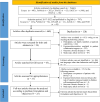Spousal Involvement in Collaborative Management and Glycemic Behavior Change among Patients with Diabetes Mellitus: A Systematic Review
- PMID: 38638412
- PMCID: PMC11025446
- DOI: 10.1177/23779608241245196
Spousal Involvement in Collaborative Management and Glycemic Behavior Change among Patients with Diabetes Mellitus: A Systematic Review
Abstract
Introduction: The marked increase in the number of individuals with diabetes mellitus (DM) worldwide each year has resulted in the importance of the spouse's contribution to the promotion and support of patient self-management programs.
Objectives: This study aimed to systematically explore the role or involvement of spouses in collaborative management and glycemic behavior change in DM.
Methods: Five databases including Scopus, PubMed, Cumulative Index of Nursing and Allied Health Literature, SAGE, and Web of Science were reviewed for relevant articles retrieved from 2017 to 2022. Literature search used keywords, including "Spouse," "Support," "Self-management," "Glycemic Control," and "Diabetes mellitus." The Joanna Briggs Institute guidelines were used for appraisal review of journals. The component of partner support in the self-management of patients with DM is associated with an increase in the patient's glycemic level.
Results: Twenty-five studies were identified that describe the different spousal roles and strategies in the promotion and support of DM management. Overall, spouses' involvement positively impacted healthy diets, higher self-efficacy, improved quality of psychological well-being, increased perceived support, and changes in glycemic-influenced behavior. Adaptation in the spouse patient relationship including maintaining cohesiveness can result in positive coping is essential in normalizing and contextualizing the chronic condition of DM. Partner-based collaboration is important for diabetes management, overcoming management barriers, and generating communal coping.
Conclusion: This systematic review observed that the involvement of a spouse is important in improving collaborative management and results in better glycemic behavior in patients with DM. A better understanding of the relationship between spousal involvement, coping strategies, and adherence in daily management and the subsequent use of this information are highly useful for creating targeted and effective interventions.
Keywords: diabetes; glycemic control; self-Management; spousal involvement.
© The Author(s) 2024.
Conflict of interest statement
The author(s) declared no potential conflicts of interest with respect to the research, authorship, and/or publication of this article.
Figures
Similar articles
-
Behavioural interventions for type 2 diabetes: an evidence-based analysis.Ont Health Technol Assess Ser. 2009;9(21):1-45. Epub 2009 Oct 1. Ont Health Technol Assess Ser. 2009. PMID: 23074526 Free PMC article.
-
A Systematic Review: Family Support Integrated with Diabetes Self-Management among Uncontrolled Type II Diabetes Mellitus Patients.Behav Sci (Basel). 2017 Sep 15;7(3):62. doi: 10.3390/bs7030062. Behav Sci (Basel). 2017. PMID: 28914815 Free PMC article. Review.
-
Promoting and supporting self-management for adults living in the community with physical chronic illness: A systematic review of the effectiveness and meaningfulness of the patient-practitioner encounter.JBI Libr Syst Rev. 2009;7(13):492-582. doi: 10.11124/01938924-200907130-00001. JBI Libr Syst Rev. 2009. PMID: 27819974
-
Correlates of concealment behavior among couples coping with cancer: Actor partner model.Psychooncology. 2018 Feb;27(2):583-589. doi: 10.1002/pon.4552. Epub 2017 Sep 21. Psychooncology. 2018. PMID: 28868807
-
Spouses' experience of caregiving for cancer patients: a literature review.Int Nurs Rev. 2013 Jun;60(2):178-87. doi: 10.1111/inr.12000. Epub 2012 Nov 21. Int Nurs Rev. 2013. PMID: 23692000 Review.
Cited by
-
The Morisky Method for Measuring Medication Adherence in Older Adults With Chronic Diseases: A Cross-Sectional Study.Health Sci Rep. 2025 Apr 28;8(5):e70681. doi: 10.1002/hsr2.70681. eCollection 2025 May. Health Sci Rep. 2025. PMID: 40303908 Free PMC article.
-
A Couple-Based Intervention for Chinese Older Adults With Type 2 Diabetes: A Randomized Clinical Trial.JAMA Netw Open. 2025 Jan 2;8(1):e2452168. doi: 10.1001/jamanetworkopen.2024.52168. JAMA Netw Open. 2025. PMID: 39745703 Free PMC article. Clinical Trial.
-
Marital status and risk of type 2 diabetes among middle-aged and elderly population: a systematic review and meta-analysis.Front Med (Lausanne). 2025 Jan 3;11:1485490. doi: 10.3389/fmed.2024.1485490. eCollection 2024. Front Med (Lausanne). 2025. PMID: 39830378 Free PMC article.
-
The effect of life skills training on reducing domestic violence and improving treatment adherence in women with diabetes experiencing intimate partner violence: a randomized clinical trial based on the theory of self-efficacy.BMC Public Health. 2024 Dec 5;24(1):3390. doi: 10.1186/s12889-024-20913-y. BMC Public Health. 2024. PMID: 39639251 Free PMC article. Clinical Trial.
References
-
- August K. J., Kelly C. S., Markey C. H. (2021). Reciprocity and personality in diet-related spousal involvement among older couples managing diabetes: The role of gender. Journal of Social & Personal Relationships, 38(1), 363–383. 10.1177/0265407520962850 - DOI
Publication types
LinkOut - more resources
Full Text Sources

